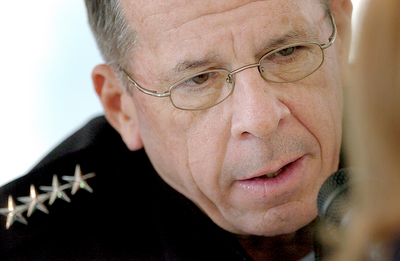Obama Sends Top National Security Aides to Moscow
January 21, 2010
Featured Image
We are happy to serve you a daily summary of the day's top nuclear policy stories each morning, with excerpts from the stories in bullet form.
Stories we're following today:
Jones, Mullen to Russia to work on nuclear deal - Associated Press [link]
- In a sign that a new arms deal with Russia may be close, President Barack Obama is sending two top national security aides to Moscow to work on clearing the last obstacles.
- National Security Adviser James Jones was heading to the Russian capital Wednesday, and Joint Chiefs Chairman Adm. Mike Mullen was also going, White House spokesman Mike Hammer said. He said the trip is "primarily to discuss the remaining issues left to conclude a new START treaty."
- The talks are set to resume on Monday. Last week, Undersecretary of State for Arms Control Ellen Tauscher told reporters the two sides are "really close to an accord."
Vice President Biden Commends Shultz, Kissinger, Nunn and Perry on their Continued Work on Nuclear Non-Proliferation - The White House [link]
- For decades, the leadership of these eminent statesmen has enhanced our nation’s liberty and prosperity, and their enduring commitment serves as an inspiration for our pursuit of the peace and security of a world without nuclear weapons.
- The greatest threat facing the American people today is the spread of nuclear weapons to additional states and to terrorists, and we will spare no effort in protecting the American people from this danger.
- I encourage members from both parties to embrace these policies, and to heed the wisdom these four esteemed statesmen have demonstrated time and again
Four Horseman Rebuff Kyl - Max Bergmann in The Wonk Room [link]
- William Perry, George Schultz, Henry Kissinger, and Sam Nunn – two Republicans and two Democrats – have been four of the most prominent and vocal advocates of eliminating nuclear weapons and their efforts have significantly influenced President Obama and the global nuclear debate.
- Their op-ed today importantly does not support one of the key arguments made by conservatives like Senator Jon Kyl (R-AZ), that the US needs to build new nuclear warheads because existing ones are “deteriorating.”
- By supporting the findings of the JASON study, Schultz, Perry, Kissinger, and Nunn are in no way supporting the construction of a new nuclear warhead, since the study found that as long as current maintenance programs are in place, building a new nuclear warhead is simply unnecessary.
- While the op-ed calls for maintaining the efficacy of nuclear labs and for ensuring proper funding for nuclear programs relevant to maintaining the nuclear force, this is something that the Administration and arms-control advocates support as well and in no way conflicts with the effort to work toward eliminating nuclear weapons.
U.S., Russia never so close on Iran nuclear issue: diplomat - Xinhua [link]
- The positions of Washington and Moscow on the Iranian nuclear issue "have never been so near," said U.S. Ambassador to Russia John Beyrle here on Wednesday.
- Washington was mulling over the switch from dialogue to sanction against Tehran, said Beyrle. If Iran turned down the draft deal brokered by the International Atomic Energy Agency (IAEA), to which so far it has not responded, then one should prepare for something more serious, said Beyrle.
- Discussions held on Saturday between negotiators from Iran, five permanent members of the UN Security Council and Germany on the Iranian nuclear issue in New York ended with no clear agreement.
Hawks, doves launch media war - Politico [link]
- Engaged in a renewed battle over the proliferation of ballistic missiles and nuclear weapons, interested parties on all sides of the issue are waging war with the latest media strategies.
- The conservative Heritage Foundation, for instance, has modernized its message, producing the new film “33 Minutes: Protecting America in the New Missile Age,” which warns of the looming threats posed by missiles, terrorists and nuclear weapons and stresses the need to counter threats with massive missile defense systems.
- Some of the think tank’s opponents have snared a copy and will screen it with their own discussion Thursday evening at the Center for American Progress.
- “The film spends a lot of time describing the disastrous consequences of a missile strike on the United States,” writes Matthew Duss, a national security researcher for the Center for American Progress’s Action Center, who arranged the showing. “What it failed to do, in my view, was show that any such attack was remotely likely.”
A View from the Dark Side
It's all about Tehran and Pyongyang - Foreign Policy Shadow Government Blog [link]
- President Obama starts 2010 with a crowded agenda for his second year in office. His greatest challenge this year will be turning his rhetoric about a world free of nuclear weapons into reality.
- Despite having spent much of 2009 pursuing a follow-up agreement to the Strategic Arms Reduction Treaty (START), Obama has little to show for his abandonment of U.S. missile defense sites in Poland and the Czech Republic and other steps taken as part of his "reset" of the U.S.-Russian relationship.
- Posing perhaps the greatest challenge to the president's disarmament agenda in 2010 will be the actions of Iran and North Korea. Obama has bolstered his disarmament agenda by arguing that U.S. nuclear reductions and ratification of treaties like the CTBT will somehow convince Iran and North Korea to forgo their nuclear ambitions.



